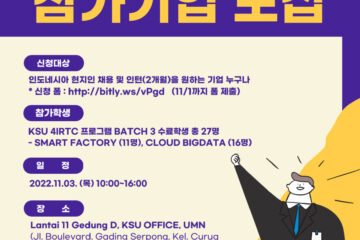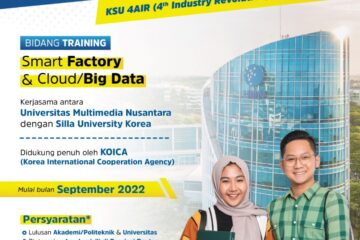Computers have three aspects, namely software, hardware and networks. Now, with the increasing use of technology, companies operating in cyberspace such as e-commerce, are aggressively looking for computer technicians who can master the three aspects which are often referred to as Full-Stack Engineers. Quoted from Forbes, Full-Stack Engineer is defined as a technician who can master not only the back-end but also the front-end.
Students who are members of the Computer Engineering study program at Multimedia Nusantara University (UMN) study these three aspects.
“Computer Engineering is a custom department that masters partly informatics skills and partly electrical engineering skills. We mediate between the two professions. So, we learn about hardware and we can also develop software,” explained Head of the Computer Engineering Study Program, Hargyo Tri Nugroho.
Hargyo added, although studying these three aspects, UMN Computer Engineering students focus more on communication between computers or what can be called a computer network.
In order to deepen knowledge about computer networks, UMN’s Computer Engineering study program collaborated with Huawei by becoming the first Huawei Authorized Information and Network Academy (HAINA) in Indonesia. In addition, this study program also collaborates with Red Hat to become the second Red Hat Academy but the only one that is still active in Indonesia.
To foster a collaboration, UMN must have infrastructure that meets the criteria, high-tech laboratories and lecturers from officially certified practitioners, such as Huawei, Red Hat and other institutions.
“In Computer Engineering, I can say that 100% of the lecturers are practitioners. So, automatically what we convey does not only use books but also from experience,” said Hargyo.
Furthermore, Hargyo stated that UMN Computer Engineering graduates have broad job prospects. By studying software, hardware and networking, the profession that can be taken becomes more flexible.
“With complete knowledge, they (Computer Engineering graduates) can take up a relatively broad profession as well. Whether in terms of hardware, software, computer networks, or a combination of the three,” continued Hargyo.
Meanwhile, Chairman of the Computer System Student Association (HIMASIKOM) Stefanus Kurniawan said that
The knowledge gained in the UMN Computer Engineering study program is not only hard skills (academic) but also soft skills.
“On the other hand, Computer Engineering is also taught how to lead a project, how to communicate between teams, so that the knowledge we get is not only hard skills but also soft skills,” concluded Stefanus. (*/CRA)
By Alya Dwi Achyarini – Multimedia Nusantara University News Service




0 Comments